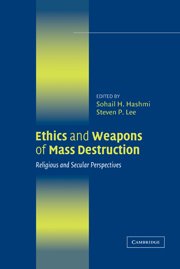Book contents
- Frontmatter
- Contents
- Tables and Figures
- Acknowledgments
- Abbreviations
- Ethics and Weapons of Mass Destruction
- Introduction
- 1 Weapons of Mass Destruction: A Brief Overview
- 2 The International Law Concerning Weapons of Mass Destruction
- PART ONE THE ORIGINAL DEBATE
- PART TWO EXPANDING THE CONVERSATION
- 11 Buddhist Perspectives on Weapons of Mass Destruction
- 12 Buddhism and Weapons of Mass Destruction: An Oxymoron?
- 13 Confucianism and Weapons of Mass Destruction
- 14 “Heaven's Mandate” and the Concept of War in Early Confucianism
- 15 Hinduism and the Ethics of Weapons of Mass Destruction
- 16 Hinduism and Weapons of Mass Destruction: Pacifist, Prudential, and Political
- 17 Islamic Ethics and Weapons of Mass Destruction: An Argument for Nonproliferation
- 18 “Do Not Violate the Limit”: Three Issues in Islamic Thinking on Weapons of Mass Destruction
- 19 Judaism, War, and Weapons of Mass Destruction
- 20 Between the Bible and the Holocaust: Three Sources for Jewish Perspectives on Mass Destruction
- PART THREE CRITICAL PERSPECTIVES
- Contributors
- Index
11 - Buddhist Perspectives on Weapons of Mass Destruction
Published online by Cambridge University Press: 05 June 2012
- Frontmatter
- Contents
- Tables and Figures
- Acknowledgments
- Abbreviations
- Ethics and Weapons of Mass Destruction
- Introduction
- 1 Weapons of Mass Destruction: A Brief Overview
- 2 The International Law Concerning Weapons of Mass Destruction
- PART ONE THE ORIGINAL DEBATE
- PART TWO EXPANDING THE CONVERSATION
- 11 Buddhist Perspectives on Weapons of Mass Destruction
- 12 Buddhism and Weapons of Mass Destruction: An Oxymoron?
- 13 Confucianism and Weapons of Mass Destruction
- 14 “Heaven's Mandate” and the Concept of War in Early Confucianism
- 15 Hinduism and the Ethics of Weapons of Mass Destruction
- 16 Hinduism and Weapons of Mass Destruction: Pacifist, Prudential, and Political
- 17 Islamic Ethics and Weapons of Mass Destruction: An Argument for Nonproliferation
- 18 “Do Not Violate the Limit”: Three Issues in Islamic Thinking on Weapons of Mass Destruction
- 19 Judaism, War, and Weapons of Mass Destruction
- 20 Between the Bible and the Holocaust: Three Sources for Jewish Perspectives on Mass Destruction
- PART THREE CRITICAL PERSPECTIVES
- Contributors
- Index
Summary
Contrary to popular views of Buddhist pacifism, this chapter holds that Buddhist laity have sometimes advocated violence or the threat of violence for specific social roles and in extreme historical situations. Like other political leaders, Buddhist rulers traditionally used physical force to protect their countries. Although governments with large Buddhist populations (such as Japan, Sri Lanka, Bhutan, Mongolia, and Thailand) reject the use of weapons of mass destruction, and the Tibetan government-in-exile has advocated a nuclear-free zone, Buddhist organizations in France, England, and the United States have largely acquiesced in national policies of nuclear deterrence. While this chapter acknowledges that the acceptance of WMD as a deterrent by some Buddhists during the cold war was not an anomaly in Buddhist history, the main point to emphasize is that neither practical arguments nor Buddhist principles can support the deployment of WMD today, and they should be rejected based on the ultimate Buddhist goals of nonviolence and the protection of all living beings.
Most Buddhists do not advocate the use of violence except as a last resort, if at all, and the thrust of lay Buddhist ethics is toward pacifism. Although I argue here that, in the light of modern history and Buddhist political experience, the deployment WMD might have been justified during the cold war, this policy should have been supported by efforts to build greater cross-cultural awareness, economic fairness, and political inclusiveness in the global community.
- Type
- Chapter
- Information
- Ethics and Weapons of Mass DestructionReligious and Secular Perspectives, pp. 213 - 236Publisher: Cambridge University PressPrint publication year: 2004

